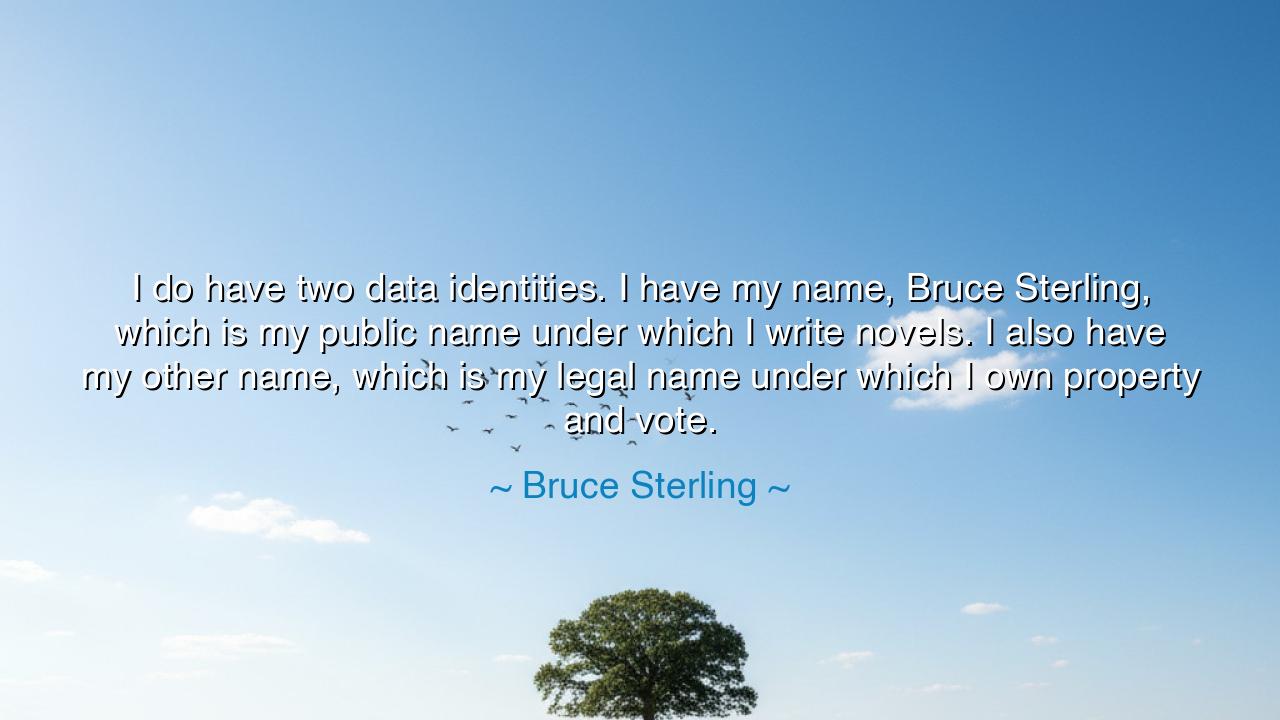
I do have two data identities. I have my name, Bruce Sterling
I do have two data identities. I have my name, Bruce Sterling, which is my public name under which I write novels. I also have my other name, which is my legal name under which I own property and vote.






Hear the words of Bruce Sterling, prophet of the digital age, who spoke with clarity about the split nature of the self in modern times: “I do have two data identities. I have my name, Bruce Sterling, which is my public name under which I write novels. I also have my other name, which is my legal name under which I own property and vote.” These words carry not only the story of one man, but the truth of all who live in an era where identity is no longer a single face, but a tapestry woven of names, roles, and digital traces.
The origin of this saying lies in Sterling’s work as a writer and thinker, especially within the cyberpunk tradition, which foresaw the ways technology would blur the lines between human and machine, real and virtual, public and private. He understood that in this world, we no longer live with one simple identity. Instead, we craft and carry multiple selves—one for the marketplace, one for the home, one for the state, one for the web. Each is true, yet none is the whole. His reflection upon his public name and legal name is thus a symbol of the fragmentation and multiplication of identity in the modern era.
History too shows us the dance of names and selves. Consider the Roman general Publius Ovidius Naso, known to all simply as Ovid. His poetry flowed under the name that inspired the hearts of lovers, but his citizen identity bound him to the duties of empire. Or recall the Japanese samurai who bore a battle name for war and another name for peace, separating their life of duty from their inner self. Sterling stands in this long tradition, reminding us that names are masks we wear, yet masks that reveal as much as they conceal.
Yet in our time, the division runs deeper. For with the rise of the internet, our data identities multiply beyond even our control. There is the identity that pays bills and casts votes, the identity that posts online and creates art, the identity known to corporations through their records, and the identity stored in the unseen servers of governments. Sterling’s reflection is not merely personal; it is prophetic, calling us to recognize that we are fractured beings in the digital age, with fragments of ourselves scattered across countless databases.
The danger is clear. If we forget the difference between our public name and our legal name, between our projected selves and our foundational self, we risk losing control of who we truly are. To live only for the public persona is to become hollow, trapped in the image others consume. To cling only to the legal self is to suffocate, never allowing creativity and expression to breathe. The wisdom Sterling offers is balance: to know each identity, honor each, and yet remain whole beneath them all.
The lesson for us is this: we must not let our data identities own us, but instead take ownership of them. Know what you share with the world, know what you entrust to the law, and know what you keep for yourself. Guard your private life, for it is the root of your freedom. Yet do not fear the public life, for it is the root of your influence. Like two wings of a bird, both must be strong if you are to fly.
And what then shall we do in practice? Be mindful of the identities you build online and offline. Do not neglect the duties tied to your legal name—the responsibilities of citizenship, the stewardship of property, the weight of law. But also do not neglect the gifts tied to your public name—your creativity, your reputation, your contribution to culture. Shape both with integrity, lest one day you look in the mirror and no longer recognize the self that stares back at you.
So remember the wisdom of Bruce Sterling: in this age, we are not one, but many. Each name we carry is a thread of our being, each role a part of our truth. Hold them together with honor, let them serve you rather than enslave you, and pass on to future generations the art of living as whole human beings in a fractured digital world.






AAdministratorAdministrator
Welcome, honored guests. Please leave a comment, we will respond soon